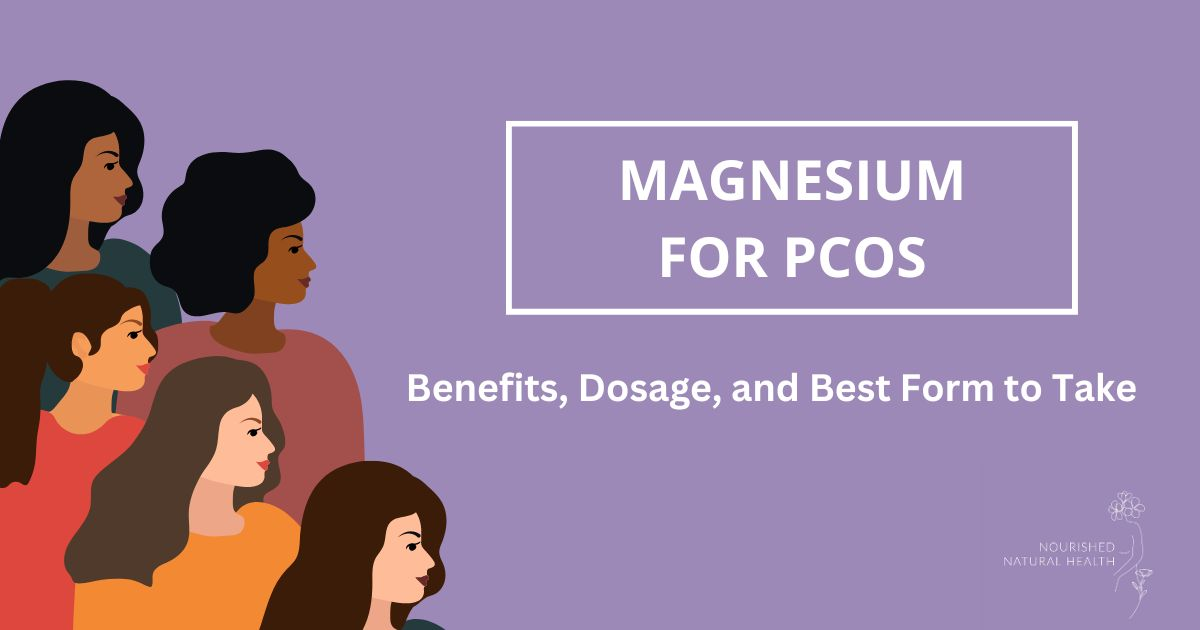
Magnesium and PCOS
Magnesium is a truly amazing mineral.
Hailed as nature's tranquiliser - Magnesium can improve everything from your heart health to your headaches. And Magnesium has special importance for PCOS too.
Yet many of us just don't get enough.
Here we look at why Magnesium and PCOS go hand in hand, as well as how you can find the best magnesium supplement for PCOS too.
The role of Magnesium in your body
- Supporting nerve transmission
- Helping with muscle relaxation
- Preventing an irregular heartbeat
- Regulating blood glucose levels
- Maintaining energy levels
The Benefits of Magnesium for PCOS Symptoms
Aside from the aforementioned benefits, Magnesium also offers a wide range of benefits for people with PCOS too.
Below are some of its main advantages.
1. Regulation of Insulin and Glucose Levels
Insulin resistance is associated with PCOS.
It is often found in women with the condition and is thought to both contribute to and worsen symptoms.
Women with PCOS are often prescribed glucose regulating meditation such as metformin which is often used to treat diabetes too.
Helpfully, Magnesium is also able to help with glucose regulation.
3 months of Magnesium supplementation has led to a significant reduction in HBA1C (blood glucose levels).
Improved glycaemic control was also noted.
So, Magnesium can be a really useful asset for those with the insulin resistance PCOS subset - but also for women who have elevated glucose levels too.
2. Improvement in Hormonal Balance
It’s not just elevated blood glucose and insulin resistance that contributes to PCOS.
It's also heavily linked to an excess of androgens.
This androgen excess contributes towards common PCOS symptoms such as hirsutism (excess hair growth) and acne.
Magnesium has been shown to reduce levels of androgens in women with PCOS, which is one of the reasons it’s often recommended as a supplement to form part of a holistic PCOS management plan.
3. Additional Nutrients and Ingredients for Synergistic Effects
The best ingredients to combine with Magnesium are Zinc, Green Tea and Saw Palmetto.
This is because they have overlapping yet distinct benefits.
Here you will get a synergistic effect which targets multiple areas of PCOS causes at once.
Below are a range of our best products which offer you all these ingredients and more.
Nourished Natural Health’s Magnesium-Rich PCOS Supplements
1. Nourished PCOS Blood Sugar Balance
(https://nourishednaturalhealth.com/products/PCOS-blood-sugar-balance)
2. PCOS Essentials Bundle
(https://nourishednaturalhealth.com/products/PCOS-essentials-bundle)
3. Insulin Resistant PCOS Bundle
(https://nourishednaturalhealth.com/products/insulin-resistant-PCOS-power-pack)
Recommended Magnesium Dosage and Administration
Just because the evidence suggests that Magnesium can help with PCOS, it’s important that you take the right amount and stay safe.
Below are some top tips to do just that.
1. General Recommended Dosage for Magnesium
Generally, women need to take around 320 mg of Magnesium per day. So this might be obtained through a combination of diet and supplements.
For example if you don’t tend to consume many Magnesium rich foods such as dark leafy greens and nuts, you will be more likely to need a supplement to cover most of your intake.
2. Factors Affecting the Magnesium Dosage for PCOS Patients
Factors affecting the idea of Magnesium intake for PCOS patients includes your current diet, other health issues, use of medication, and stress levels.
Therefore it's a good idea to check with a doctor before starting a Magnesium supplement to check for any contraindications.
Similarly, you might need a higher amount of Magnesium if you are found to have a true Magnesium deficiency although this is quite hard to test for unless you are having quite severe and obvious symptoms.
3. Safe Upper Limit for Magnesium Intake
You shouldn't exceed around 400mg of Magnesium unless your doctor has told you otherwise.
This is because excessive intakes can affect your heart and in extreme cases can cause death.
As long as you stick to the safe upper limits and don’t exceed the amount on your supplement then Magnesium is safe to take for most people.
If you already have kidney or heart issues you should always check with your doctor first however.
Incorporating Magnesium into the PCOS Diet
In order to make sure you get optimum levels of Magnesium, it’s usually a good idea to focus on increasing dietary sources of this mineral, as well as adding in a supplement for extra support.
1. Dietary Sources of Magnesium
- Dark leafy greens
- Cashew nuts
- Dark chocolate
- Peanut butter
- Spinach
- Green beans
- Sesame seeds
- Quinoa
2. When to Consider Magnesium Supplements
Many people who don’t have a pre existing condition can benefit from more Magnesium.
This is because it can be hard to get enough through diet alone.
This is partly because soil mineral levels have become depleted leading to lower concentrations within common foods.
Also, many people live stressful lives and this can further deplete Magnesium stores too, as can excess exercise.
For people with a condition such as high blood pressure, heart disease, migraines or PCOS, a supplement may be a great addition.
This acts as an insurance policy to make sure you get enough to target some of the root causes of your condition.
3. Combination of Magnesium with Other Nutrients for PCOS
We’ve talked about how essential Magnesium is for PCOS.
But here at Nourished Natural Health, we prefer to take a more holistic approach.
This is because PCOS is a complex, multifactorial condition.
Therefore, it needs a number of different treatment options for the best effects.
So ideally aim to combine a number of PCOS effective ingredients such as ZInc, Green Tea, Saw Palmetto and more.
We have combined these very ingredients in our most popular blends including our Androgen Blocker.
Here you gain the benefits of all these wonderful ingredients, which can work synergistically to reduce your acne, lower your androgens and support your blood glucose levels.
Frequently Asked Questions
How does magnesium supplementation specifically benefit women with PCOS?
Magnesium targets a number of key factors which can both drive or worsen PCOS.
These include glucose regulation, pain, anxiety, inflammation and adrenal type PCOS which is worsened by stress.
Can magnesium help with insulin resistance, a common symptom of PCOS?
Yes, in fact this is one of the key mechanisms behind Magnesiums benefits for PCOS patients.
Taken regularly Magnesium may help to reduce insulin resistance and help to regulate elevated blood glucose levels.
This in turn can help with PCOS which is sometimes caused, and often worsened by insulin resistance.
What is the recommended daily dosage of magnesium for women with PCOS?
The recommended daily intake of Magnesium is 320 mg daily for women.
If you have a deficiency then you may need more, but it's important not to exceed around 400 mg per day as excessive Magnesium intake can lead to serious side effects including heart rhythm disturbances.
Are there any specific time or meal recommendations for taking magnesium supplements?
Because Magnesium supplements can sometimes cause stomach upsets, it's a good idea to take them around the time of a meal or snack as this may help to minimize some of these symptoms.
Taking Magnesium at the same time of day can help you to be consistent, and some people like to take it later in the day to support sleep.
Are there any potential side effects or risks associated with magnesium supplementation?
Yes - stomach upsets can be a fairly common side effect, especially when you are starting out, and if you take certain forms such as citrate and oxide this may be more likely.
But generally if you stay to the safe upper limit and follow your supplement guidelines you should be fine.
But Magnesium is not something you should take too much of as in excess it can disrupt your heart functioning.
Can magnesium supplements interact with other medications commonly used for PCOS?
Magnesium can interfere with some blood glucose regulating medications which are sometimes prescribed as part of a PCOS management plan.
So do check with your doctor if you are worried about any contraindications.
How long does it take to see the effects of magnesium supplementation on PCOS symptoms?
This might vary depending on whether or not you have a Magnesium deficiency, as well as what is causing or worsening or symptoms.
But there is some evidence to show that just 10 weeks of Magnesium supplementation at 250mg a day caused a positive reduction in PCOS symptoms.
What other dietary changes or supplements can complement the benefits of magnesium for PCOS?
Whilst Magnesium is very effective at treating a range of PCOS symptoms, you can also benefit from adding in Green tea and Zinc as part of a holistic supplement regime.
It's also important to eat a hormone balancing fiber rich diet, packed with nutrient dense foods, plenty of antioxidants and healthy fats.
Are there any specific magnesium-rich foods that women with PCOS can include in their diet?
Magnesium rich foods include dark green leafy veg, cashews, peanuts and dark chocolate.
Is there a particular form of magnesium that is more effective for PCOS symptoms?
Many types of magnesium can be effective.
Some of the best absorbed include Magnesium bisglycinate, Magnesium glycinate and Magnesium citrate.
Ideally avoid high amounts of Magnesium oxide which is more likely to cause stomach issues.
Are there any age restrictions or precautions for taking magnesium supplements for PCOS?
There are no specific concerns around safe ages for Magnesium supplementation when taking it for PCOS - as long as you stick to the safe upper limit for your age range, and keep note of any symptoms which may be caused by excessive intakes.
Is it safe to take magnesium supplements during pregnancy or while breastfeeding?
Magnesium is entirely safe to be taken during breastfeeding as long as you don't exceed the upper limits.
There is a possibility that high doses of Magnesium during pregnancy can delay the onset of lactation, so it's a good idea to check with your medical practitioner before supplementing during pregnancy.
How long should one continue taking magnesium supplements for PCOS management?
Because Magnesium is so essential for general health, it can be useful to supplement on an ongoing basis.
This is especially true if you are stressed as stress depletes your Magnesium stores.
As long as you stick to the safe limits of your chosen supplement, and don't have any side effects or contraindications you can keep taking Magnesium indefinitely for your PCOS and general wellbeing.
References used for this article
https://www.ncbi.nlm.nih.gov/pmc/articles/PMC5852744/#:~:text=We%20concluded%20that%20high%20Mg,disease%20and%20coronary%20heart%20disease
https://www.mayoclinic.org/drugs-supplements/magnesium-supplement-oral-route-parenteral-route/proper-use/drg-20070730#:~:text=Proper%20Use,-Drug%20information%20provided&text=Magnesium%20supplements%20should%20be%20taken,empty%20stomach%20may%20cause%20diarrhea








No Comments Yet
Be the first to share your thoughts!
Leave a Comment